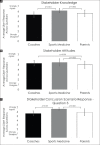Coach, sports medicine, and parent influence on concussion care seeking intentions and behaviors in collegiate student-athletes
- PMID: 32671281
- PMCID: PMC7357618
Coach, sports medicine, and parent influence on concussion care seeking intentions and behaviors in collegiate student-athletes
Abstract
Background: Sport is a socio-ecological framework where student-athletes are part of a larger community of stakeholders, including coaches, sports medicine professionals (SMPs), and parents. This framework may hold influence over whether student-athletes seek care for a concussion.
Aim: We aimed to describe, compare, and determine the influence of stakeholder concussion knowledge, attitudes, and concussion scenario responses.
Materials and methods: We recruited a sample of 477 student-athletes and their 27 coaches (response rate=46.6%), 24 SMPs (48.7%), and 31 parents/guardians (4.8%). Stakeholder surveys assessed their concussion knowledge, attitudes toward care seeking, and concussion scenario responses. Surveys administered to student-athletes assessed their concussion care seeking intentions and behaviors. Kruskal-Wallis tests were used to compare responses between stakeholder groups and to determine the differences in student-athlete intentions and behaviors (alpha=0.05).
Results: SMPs had significantly better knowledge (p<0.001) and concussion scenario responses (p<0.001) compared to both coaches and parents. SMPs also had significantly better attitudes compared to parents, but not coaches (p=0.038). Coach concussion scenario responses (p=0.044) and SMP knowledge positively influenced student-athletes' concussion care seeking intentions (p=0.049). Parent responses were not associated with their child's concussion care seeking intentions and behaviors.
Conclusions: The gap in coach and parent concussion knowledge and concussion scenario response relative to SMPs is a preliminary target for stakeholder concussion education and supports the current sports medicine model where SMPs primarily disseminate concussion education. Stakeholders, specifically coaches and SMPs, do hold influence over collegiate athlete concussion care seeking intentions and behaviors.
Relevance for patients: Stakeholders should be addressed within educational efforts aimed at student-athletes and should also complete stakeholder-specific concussion education.
Keywords: brain injury; concussion non-disclosure; concussion reporting; mild traumatic brain injury; socio-ecological model; sport culture.
Copyright © 2020, Whioce Publishing Pte. Ltd.
Conflict of interest statement
The authors have no conflicts of interest to disclose.
Figures
References
-
- McCrea M, Hammeke T, Olsen G, Leo P, Guskiewicz K. Unreported Concussion in High School Football Players:Implications for Prevention. Clin J Sport Med. 2004;14:13–7. - PubMed
-
- Llewellyn T, Burdette GT, Joyner AB, Buckley TA. Concussion Reporting Rates at the Conclusion of an Intercollegiate Athletic Career. Clin J Sport Med. 2014;24:76–9. - PubMed
-
- Rivara FP, Schiff MA, Chrisman SP, Chung SK, Ellenbogen RG, Herring SA. The Effect of Coach Education on Reporting of Concussions among High School Athletes after Passage of a Concussion Law. Am J Sports Med. 2014;42:1197–203. - PubMed
LinkOut - more resources
Full Text Sources
Miscellaneous

